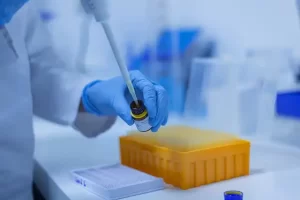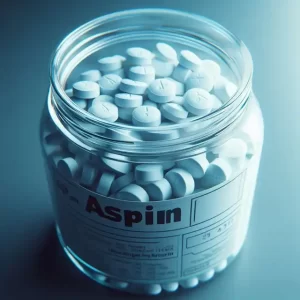BioNTech: CAR-T+mRNA Vaccine Combination for Solid Tumors Phase 1/2 Data Released
- Early Biomarker for Multiple Sclerosis Development Identified Years in Advance
- Aspirin Found Ineffective in Improving Recurrence Risk or Survival Rate of Breast Cancer Patients
- Child Products from Aliexpess and Temu Contain Carcinogens 3026x Over Limit
- Daiichi Sankyo/AstraZeneca’s Enhertu Shows Positive Results in Phase III DESTINY-Breast06 Clinical Trial
- Mn007 Molecules Offer Potential for Combating Streptococcus pyogenes Infection
- Popular Indian Spices Banned in Hong Kong Over Carcinogen Concerns
BioNTech: CAR-T+mRNA Vaccine Combination for Solid Tumors Phase 1/2 Data Released
- AstraZeneca Admits for the First Time that its COVID Vaccine Has Blood Clot Side Effects
- Was COVID virus leaked from the Chinese WIV lab?
- HIV Cure Research: New Study Links Viral DNA Levels to Spontaneous Control
- FDA has mandated a top-level black box warning for all marketed CAR-T therapies
- Can people with high blood pressure eat peanuts?
- What is the difference between dopamine and dobutamine?
- How long can the patient live after heart stent surgery?
BioNTech: CAR-T+mRNA Vaccine Combination for Solid Tumors Phase 1/2 Data Released
On October 23, BioNTech announced the results of a phase 1/2 clinical trial at the 2023 ESMO Congress.
This trial evaluated the safety and efficacy of CLDN6 CAR-T cell monotherapy and its combination with CARVac in patients with relapsed or refractory (r/r) CLDN6-positive solid tumors. The study also explored cancer-specific dose escalation.
On the same day, these clinical data were simultaneously published in Nature Medicine under the title: “CLDN6-specific CAR-T cells plus amplifying RNA vaccine in relapsed or refractory solid tumors: the phase 1 BNT211-01 trial.”
The trial data revealed promising results, showing increased durability of CAR-T therapy when combined with mRNA vaccine CARVac.

Figure: Mechanism of action of BNT211
BNT211 represents a new generation of CAR-T therapy targeting solid tumors. The combination approach involves the use of CAR-T therapy targeting the CLDN6 antigen along with the mRNA vaccine CARVac.
Claudin-6 (CLDN6), a protein expressed in various cancer types like ovarian, testicular, lung adenocarcinoma, and uterine cancer, is not found in normal adult healthy tissues. Therefore, Claudin-6 has the potential to become another cancer treatment target in the Claudin family, following Claudin18.2.
CARVac is a unique CAR-T cell amplifying mRNA vaccine designed to use mRNA encoding antigens targeted by CAR-T cells. CARVac selectively presents antigens in the lymph nodes, which match the antigens targeted by CAR-T cells, thus stimulating CAR-T cell amplification within the patient’s body.
In this study, the dosing regimen first administered a low dose of CLDN6 CAR-T to patients and then injected CARVac vaccine. This novel combination has increased durability and enhanced the killing power of tumor cells, resulting in a synergistic anti-cancer effect.
The study observed a temporary increase in the frequency of CAR-T cells in patients who received CARVac, indicating that CARVac may help promote CAR-T cell expansion and enhance its therapeutic efficacy. BioNTech intends to continue studying the impact of higher-dose CARVac and assess the effects of repeated vaccine administration on prolonging durability.
BioNTech’s co-founder and Chief Medical Officer, Professor Özlem Türeci, stated, “BNT211 aims to address two key limitations of CAR-T therapy in solid tumors: the lack of suitable tumor cell-specific targets and limited efficacy. To tackle this challenge, we have designed a CAR-T therapy targeting the CLDN6 antigen and combined it with the mRNA vaccine CARVac.”

BioNTech CAR-T therapy pipeline, source: BioNTech official website
Clinical Data
This trial included a total of 44 patients, consisting of 16 patients with germ cell tumors, 17 with ovarian cancer, and 11 with other solid tumors.
The data yielded promising results, with 38 patients among the 44 being evaluable for efficacy, achieving an objective response rate (ORR) of 45% and a disease control rate (DCR) of 74%.
In the 27 patients who received secondary-dose CARVac treatment, either alone or in combination, 13 patients experienced partial responses, resulting in an ORR of 59% and a DCR of 95%.
Safety
The effectiveness and safety of CAR-T cell therapy largely depend on target specificity. Some tumor antigens may also be expressed in healthy non-tumor tissues, leading to off-target toxicity.
During the dose escalation process, adverse events increased in a dose-dependent manner, with 23 out of the 44 patients experiencing cytokine release syndrome. In most cases, these events were grades 1 and 2, with one patient at grade 3 and one at grade 4. Two patients experienced mild and self-limiting neurotoxicity.
The administration of CARVac was well-tolerated in subjects, demonstrating its potential in combination with CAR-T cell therapy.
Currently, BioNTech is evaluating the possibility of registering a phase II trial in germ cell tumors next year and conducting a mid-stage study in ovarian cancer.
References
[1] [Link to Source](https://www.fiercebiotech.com/biotech/esmo-biontechs-new-car-t-manufacturing-process-boosts-potency-and-side-effects-too)
[2] Mackensen, A., Haanen, J.B., Koenecke, C. et al. CLDN6-specific CAR-T cells plus amplifying RNA vaccine in relapsed or refractory solid tumors: the phase 1 BNT211-01 trial. Nat Med (2023). [Link to Source](https://doi.org/10.1038/s41591-023-02612-0)
(source:internet, reference only)
Disclaimer of medicaltrend.org
Important Note: The information provided is for informational purposes only and should not be considered as medical advice.



